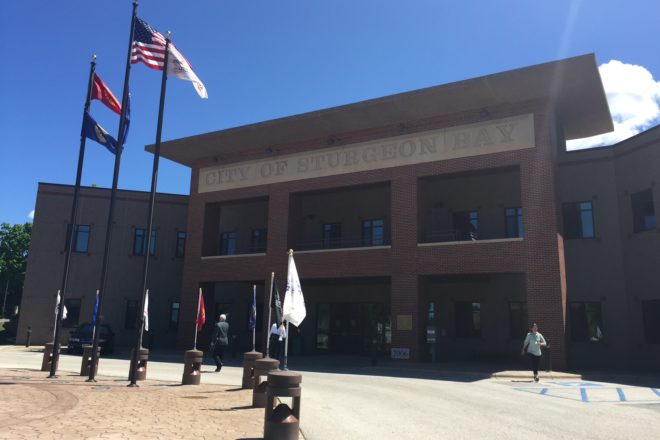Sturgeon Bay Will Create Employee Evaluation Process
- Share
- Tweet
- Pin
- Share

After a closed session discussion at its Aug. 7 meeting, the Sturgeon Bay Common Council instructed its Personnel Committee to create a formal review process for the city administrator and a timeline for the review process. The council also instructed the committee to update the city administrator’s job description.
The move comes six weeks after two council members submitted a request that Administrator Josh VanLieshout be terminated so the city could “move forward in a new direction with a new city administrator.”
VanLieshout has been in the position since Steve McNeil retired in 2015, stepping into the midst of an ugly fight over the city’s west waterfront development and a subsequent controversy over the preservation of the Teweles and Brandeis Grain Elevator.
At a July council meeting, Mayor Thad Birmingham defended VanLieshout, saying that he did not receive any formal complaints about his performance until after the termination request was made to the personnel committee.
The Pulse talked to five current and former administrators of municipalities similar to Sturgeon Bay and all were surprised to learn the city did not already have a formal review process for the administrator and department heads in place. The city has not had a review process since well before VanLieshout took the job, according to Alderman David Ward.
In public comment period earlier in the meeting, Door County Administrator Ken Pabich implored the council to move beyond the personality clashes that have dominated meetings and decisions for several years.
“I’m looking for fresh good ideas, not looking to choose a side,” Pabich said.
Those words weren’t heeded. After the council rejected a mayoral appointment to the Plan Commission, questioning why he hasn’t appointed a second council member, the mayor took a sarcastic tone when attention turned to the next agenda item, listed only as “Former Door County Cooperative Grain Elevator.”
Birmingham said he placed the item on the agenda because he has received a number of complaints about the location and odors coming from the property. The mayor then asked “Do we know who owns the granary?”
VanLieshout responded that he knows the city does not, but said he didn’t know who does. When Alderwoman Laurel Hauser asked if anyone from the city had reached out to Sturgeon Bay Historical Society with the question, Birmingham confirmed that he hadn’t.
On March 5, the Pulse reported the announcement that the Sturgeon Bay Historical Society had purchased the granary.
A call placed to Christie Weber, president of the Sturgeon Bay Historical Society, by the Pulse after the meeting confirmed that the Sturgeon Bay Historical Society owns the building, borrowing the 501 (c) (3) status of the Citizens for Our Bridge organization while the historical society waits for final approval of its own 501 (c) (3) status. Weber also confirmed that she had traded emails with VanLieshout earlier Monday, but he had never asked about ownership of the granary.
Alderwoman Kelly Avenson questioned why the city has employed a practice of not reaching out to organizations it has questions about. In December of 2017, Birmingham said he knew nothing about an anonymous donor’s pledge of $1.25 million to preserve the Granary, even though the offer was delivered to the city in writing via the Door County Community Foundation.
“May I ask that in the future if we have a project that we have questions about, that we do reach out [to that organization]?” Avenson said. “I just don’t understand why this is on here without reaching out.”
“I don’t know who to call,” Birmingham responded.
Avenson called that response unacceptable. Not only had the city administrator been in communication with Weber earlier in the day, but Weber and other members of the historical society have repeatedly addressed the council in public comment sessions.
The mayor suggested the city place a referendum on November’s ballot to let the public vote on the future of the granary. Alderman David Hayes questioned the wisdom of the city using a referendum to vote on the future of a privately owned structure.
No action was taken on the future of the granary, but the city did take action on several other items.
The council voted unanimously to approve a resolution supporting action to close the so-called dark store loophole. Stores like Walmart used the loophole to save $700 million in property taxes in 2016. The loophole allows thriving big box stores to be appraised the same as empty stores. The stores claim that because the buildings are highly customized, they don’t have resale value for third-party use and should be taxed as if they were empty. That shifts the property tax burden to homeowners and small businesses.
The council approved the borrowing of $1.48 million for capital projects such as road repair and vehicle purchases. The city now has 30 outstanding loans totalling $25.5 million in principal and $4.4 million in interest payments outstanding.
Valerie Clarizio, the city finance director and treasurer, said the borrowing is common practice.
“The city is in really good shape financially,” she said.
State law allows municipalities to borrow up to five percent of their equalized value. Sturgeon Bay’s borrowing was at 3.1 percent of equalized value in 2017, but dropped to 2.7 percent by the end of the year. Clarizio said that percentage has continued to creep down in 2018.
At the end of the meeting VanLieshout announced that Clarizio had resigned after 20 years with the city to take a new position in Little Chute.
“No doubt the city of Sturgeon Bay will miss her,” VanLieshout said. “I’ve been in this business 20 years and I have never had a co-worker like Val and we will miss her here at City Hall.”
Birmingham said he has worked with her for more than 10 years and said she is highly respected throughout the state.
“She is a consummate professional,” Birmingham said. “What she has done for this city, I just can’t say enough about her dedication.”



